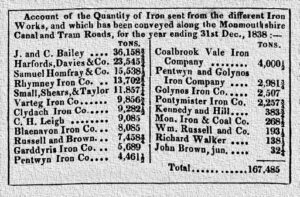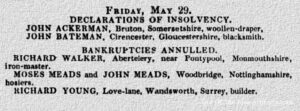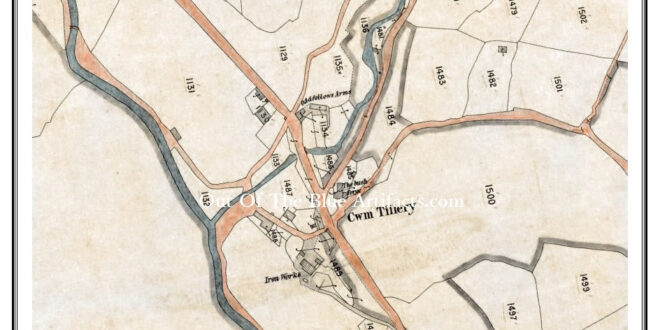Mr Richard Walker of the Abertillery Iron Works.
Mr Richard Walker was born in 1786 at Lower Sapey, Worcestershire, England. He later came to live at Trevethin, Pontypool, he became an ironmaster and during the early 1830’s he established his own ironworks at Abertillery. Sadly very little is known about him, although he was later listed as being an ironmaster, publican, brewer and a farmer.
Miss Harriet Walker.
On Thursday 24th of November 1825, Mr Richard Walker’s daughter Miss Harriet Walker, born 1806, married Mr William Webb at the Parish Church, Trevethin. Mr William Webb later became a brewer at Aberbeeg.
 Abertillery Iron Works.
Abertillery Iron Works.
Mr Richard Walker established the Iron Works at Abertillery during the early 1830’s, (situated where Tesco’s supermarket is today) it was well reported that he was sending quantities of iron down the Monmouthshire Canal and Tram Road from about 1832 to 1839.
Accounts from the 31st of December 1838 shows that he had sent 138 tons of iron through their network (as seen on the list left) in that year. That is not a great deal of iron considering Messrs Joseph and Crawshay Bailey of Nantyglo sent 36,158 tons down the tram road in the same period, though it shows he was producing significant quantities of iron at Abertillery. Another chart from 1838 shows that between 1832 and 1838, Mr Richard Walker had sent 2,496 tons of iron down the Monmouthshire Canal, again in comparison, the Baileys had sent 217,567 tons of iron down the same canal in the same time frame.
Mr Walker was also a magistrate who served on the bench at Blaina, Monmouthshire, along with other eminent men of the area at this time.
At an inquest at Blaina on the 13th April 1839 concerning the death of a worker in the employ of Mr Thomas Brown Esq (Iron Master and Colliery Proprietor) at Blaina and Cwm-Celyn, the jury consisted of gentlemen from the area including Mr Richard Walker (the Coroner wanted members of the jury to have had connections with Mr Thomas Brown Esq, though there were arguments over this, concessions were made but the jury still consisted of many prominent men known to Mr Brown).
 The Closure of the Iron Works at Abertillery.
The Closure of the Iron Works at Abertillery.
Mr Richard Walker went bankrupt in the beginning of 1840, although this bankruptcy was later annulled as reported in the Atlas General Newspaper and Journal of Literature on Friday 29th of May 1840 (as seen right). The report of annulment stated Mr Walker was from Abertelery, a variation or misspelling of Abertillery. He left the area soon after, his Iron Works at Abertillery were later taken over by Messrs J. Conway and J. Pearce and was converted into a tin plate works, known as the Abertillery Tin Works.
Miss Sarah Walker.
In June 1850, Mr Richard Walker’s youngest daughter Miss Sarah Walker, born 1812, married Mr James Temple Wightman, a mineral agent for Nantyglo and a mining engineer. They lived at Bailey Street, Brynmawr.
Llanthony Abbey.
During the 1850’s Mr Richard Walker was said to have been living at Llanthony Abbey.
Blaendare Farm, Pontypool.
On the 1861 census, Mr Richard Walker was living at Blaendare Farm, Panteg, Pontypool with his daughter and son-in-law, Sarah and James Wightman and their family, although there is nothing known of Mr Walker after this date until his death just a few years later.
The Death of Mr Richard Walker.
On Wednesday 2nd of September 1863, Mr Richard Walker died at St Nicholai near Marburg in the Empire of Austria. The report states that he had left a will with the executors being Mr William Webb, Aberbeeg coal merchant and Mr James Temple Wightman, a Pontypool coal merchant.
Aberbeeg Colliery.
At the time of Mr Walker’s death, Mr William Webb, apart from being a maltster and brewer was busy establishing the Aberbeeg Colliery (North). The colliery began under the ownership of Mr William Webb (Brewer & Maltster), Mr Thomas Spittle (Iron Founder) and Mr James Partick in 1860. The colliery had been sunk by 1862 with a great amount of money being expended on it.
Points of interest –
The main image above shows the Abertillery Iron Works, main roads, tramroad and the River Ebbw (left) with the Tillery Stream flowing into it (right). Originally the Cwmtillery area extended down the eastern side of the Tillery Stream. Abertillery was on the western side and took its name from the (the mouth of the Tillery stream) which grew around the area over time and later the boundaries moved to accommodate. Also shown is the Bush Inn and forge attached, the Oddfellows Arms and stables.
The Oddfellows Arms was owned by Mr Thomas Cardy, he was the main haulier for Abertillery, he was using many horses to haul supplies up to – and coal from – the levels in the Abertillery/Cwmtillery valleys to the tram road that ran through the town from Newport to Blaina.
In April 1856, as the railways and tramroads made their way up the adjoining valleys, Mr Thomas Cardy gave up his hauling business and sold his horses etc, the sales sheet described them by colour and size. They were measured in hands and were said to have been between fifteen and seventeen hands high. Mr Cardy said the reason for his selling-up was because of the colliery companies were employing steam and locomotive power.
Miss Mary Ann Cadman nee Walker.
Mr Richard Walker may have had another daughter, Miss Mary Ann Walker, born in about 1815 and died 1843. A Miss Mary Ann Walker married a Mr Joseph Cadman, born in 1816 at Birchills, Staffordshire, England. The couple were married at Blaenau Church, Nantyglo, Monmouthshire. The marriage report stated that at the time of marriage Miss Mary Ann Walker was from Abertillery and Mr Joseph Cadman was of the Abersychan Works, Pontypool. He later became a brewer, taking over the Pontypool Brewery after the partnership of Messrs William Webb and James Cadman in 1844. In later life he went on to become and mining engineer and moved to Neath, Swansea. (more research is needed to make a family connection and to be more precise).
 Out Of The Blue Artifacts A Library of a lifetime of collecting
Out Of The Blue Artifacts A Library of a lifetime of collecting
